#South Korean literature
Explore tagged Tumblr posts
Text
"I have dreams too, you know. Dreams . . . And I could let myself dissolve into them, let them take me over . . . But surely the dream isn't all there is? We have to wake up at some point, don't we? Because . . . Because then . . ."
Han Kang, The Vegetarian
#Han Kang#The Vegetarian#dreams#dream quotes#uncertainty#dissolve#reality#Korean literature#South Korean literature#quotes#quotes blog#literary quotes#literature quotes#literature#book quotes#books#words#text
11 notes
·
View notes
Text
There are books that describe really important topics but at the same time they are so uncomfortable for me to read. But not because of the topic itself (which would be actually better because that would mean that I have to face something new and grow) but because of the side things like vulgarity, eroticism and sexuality.
I have two particular books in mind: „Walking practice“ by Dolki Min and „Norwegian Wood“ by Haruki Murakami.
The first one talks about what it means to be human and nonbinary in the binary world and how the binary world works in the mind of a nonbinary spectator.
The second one is an amazing struggle with mental illness and how it is to function in a relationship with a person who struggles. It shows many feelings and problems but also what it means to live in a reality if it actually exists.
But both of them were explicitly (and sometimes extremly) sexual. Needlessly sexual for me.
There was too much intercourse in the „Norwegian Wood“ but while reading „Walking practice“ I felt actually repulsed by the erotic descriptions. Moreover I really felt like it didn’t bring anything to the narrative.
Vulgarity has to play a role to be used but for me it looked like really tasteless sprinkles on top of an important story (here I’m talking speciafically about „Walking practice“). Yes, I’m speaking from the perspective of the aroace person. That’s why even though the sex scenes bugged me a bit, I can accept that it’s a way of displaying deep affections in the „Norwegian Wood”.
Meanwhile the vulgar sexuality of „Walking practice“ made me really uncomfortable not in a I-m-growing-as-a-person uncomfortable but in a I-want-to-stop-reading-immidiately way. Which is sad because as I stated before I consider the story extremly important in the discussion about binary vs nonbinary culture.
#books#japan#japanese#japanese literature#literature#south korean literature#dolki min#walking practice#haruki murakami#norwegian wood#haruki murakami Norwegian wood#Dolki min walking practice#south korean books#south korea#Japanese books#nonbinary#mental illness#mental struggle#book review#critical review
20 notes
·
View notes
Text
4 notes
·
View notes
Text
A Reminder That We Are Human: ‘Human Acts’ by Han Kang Review
by Isobelle Cruz [May 21, 2023]
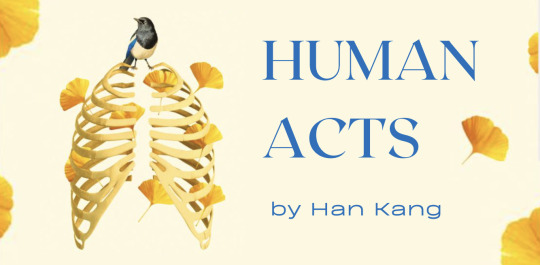
I’ve been hesitant to open up my laptop lately, afraid that I had lost it in me to write a really good article, not in terms of how many likes I receive, but on how much I enjoy the process of making it. My recent works, I admit, have felt passionless and forced for the sake of keeping my blog alive. But this is different. I devoured “Human Acts” by Han Kang over the course of one weekend—my eyes rarely drifting from its pages.
I’d never encountered an interest in the author’s works before, but once I stepped foot in the bookstore, I was suddenly drawn to its cover; simple and clean, silencing the world that surrounded me into muffled echoes.

“Gwangju Uprising” scene in Saedeuldo Sesangeul Teuneunguna at the Yeongwoo Theatre, 1988 [Image Source: Yeongwoo Mudae]
Her lips move, but no sound comes out. Yet Eun-sook knows exactly what she is saying. She recognizes the lines from the manuscript, where Mr. Seo had written them in with a pen. The manuscripts she’s typed up herself, and proofread three times.
Page 101 of Human Acts
The book features the perspectives of seven characters, one of them being an editor in 1985. Eun-sook’s chapter shows her struggle against censorship and how the company overcomes this, still able to deliver the crossed-out lines of the censors through chilling imagery. Han Kang’s writing is delivered almost in the same feels as the play tackled in her book; quiet, slow, but enough to tell the story.
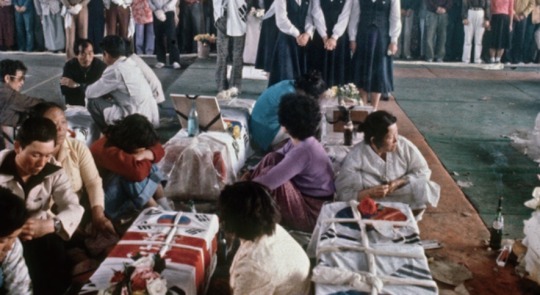
Gym turned mortuary in May 1980. [Image Source: Robin Moyer, Korea JoongAng Daily]
Another perspective that drew my attention closer than the others was of The Boy’s Friend, Jeong-dae. The words of the dead were briefly featured in the book; faceless spirits hovering over their bodies and watching as others live on, unable to do anything but watch.
If I could escape the sight of our bodies, that festering flesh now fused into a single mass, like rotting carcass of some many-legged monster. If I could sleep, truly sleep, not this flickering haze of wakefulness. If I could plunge headlong down to the floor of my pitch-dark consciousness.
Page 56 of “Human Acts”
It was depressing, and made me conscious of the body I still have control over—a blessing that I often take for granted.
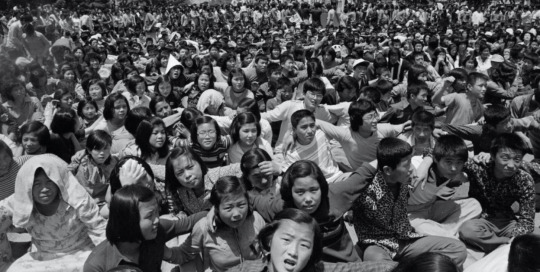
Students on the streets of Gwangju, 1980 [Image Source: Lee Chang-seong, May 18 Memorial Foundation]
Is it possible to bear witness to the fact that of a foot-long wooden ruler being repeatedly thrust into my vagina, all the way to the back wall of my uterus? To a rifle butt bludgeoning my cervix? To the fact that, when the bleeding wouldn’t stop and I had gone into shock, they had to take me to the hospital for a blood transfusion?
Page 164 of Human Acts
Human Acts is flinchingly explicit and gory. It tells the stories of victims from different angles, some of which I would forget to consider if I had not opened this book.
It disturbs me to display these photos on here, but I believe that if words are not enough to deliver chills to the blinded eyes of people, photographs will.
The kids in the photo aren’t lying side by side because their corpses were lined up like that after they were killed. It’s because they were walking in a line.
Page 133 of Human Acts
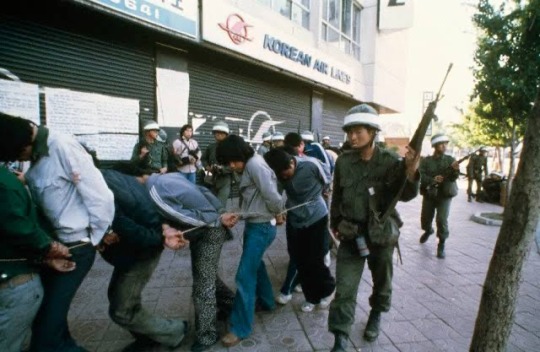
Whether you read this in the rain, or at the beach where life is supposed to be happy, a strike of pain will stay in the back of your chest, the images of agony haunting you even in bed.
Human Acts truly opened my mind much more than the other books I’ve read that spit out facts and statistics, so much so, that I am driven away from what matters most—feeling and sympathizing with the victims. Most books I’ve encountered focus solely on hating the dictator that I finish them feeling sort of empty, that I am the same person as I was when I started the book. But that is not the case with Han Kang’s third novel. It reminded me that I am human, and how much my life should be valued.
#han kang#human acts#south korean literature#korean history#asian literature#asian author#asian history#martial law#chun doo hwan#gwangju massacre#gwangju uprising#May 18
11 notes
·
View notes
Text
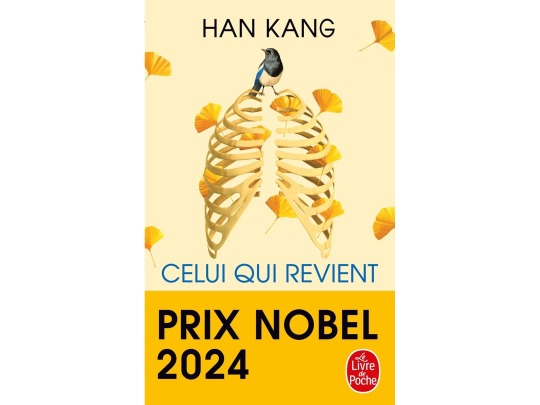
Title: Human Acts/Celui qui revient Author: Han Kang Translators: Jeong Eun-Jin, Jacques Batilliot "Aren't you the guy with the NO BUYING NEW BOOKS UNTIL THE TBR IS DEAD guy? Shouldn't you be unable to read very recent book? This clearly says 2024 on the cover."
And don't you want to shut the fuck up?
There's a possibility that I entered the bookshop, intending to buy books as gifts, and that I bought a lot of gifts (for myself). Maybe I'll allow myself to buy stuff again. Like a lunatic. (One day, my TBR will surely kill me in a freak accident. A particularly heavy tome will crack my skull like an egg. A worthy way to go.)
Han Kang, then. Wee, hoo! South Korea's first step into my reading activities. I was familiar with her name because of The Vegetarian, so when I saw that she had won a Nobel for this one, I thought, why not?
Human Acts examines the Gwangju Uprising of 1980 -- a popular movement vying for democracy, which got repressed into a bloody pulp -- through the event of the killing of a child ; through the eyes of the people who lived near him around the time of his death ; through much later-on events and happenings that deal with flesh, blood, pain, oppression ; through the inevitability of flesh. It's a poetic book, a rather short book.
It made me sick at several points. I am very wimpy when it comes to gore -- I feel it in my own flesh, I can't take it very well (completely unrelated: it fascinates and attracts me). This book is, in a way, about the absurd and unrelenting pain a body and mind can endure. There are several depictions of torture. I wouldn't even call them very graphic -- they're even a little bit muted. But torture is inherently jarring, the notion of such a violence having been real, having been wanted, and meticulously performed, made me need to take a few seconds to let the waves of nausea recede. I mean, that or I was just sick. I was also just sick at the time. I also got fully unrelated waves of nausea because I was sick.
This book is sticky with blood. Every other page, you will be made intimate with the nastiness of a human body made of flesh. It literally opens on the dealings of the temporary morgue set up after the initial massacre. Bodies rot, flesh decays, souls watch it turn into putrid goo and ashes. This was my favorite part. It's beautiful and interesting.
Petit aparté en français -- le texte traduit m'a vraiment beaucoup posé question. J'ai buté sur plusieurs points de confusion. Au départ, j'ai accusé mon propre manque de compréhension, notamment dans le deuxième chapitre. Mais pourquoi, si ce chapitre est sensé être du point de vue d'un des deux garçons, pourquoi est-ce qu'il est genré au féminin ? Et pourquoi seulement une partie du temps, et de manière irrégulière ? Pendant ma lecture, je n'ai jamais totalement compris qui parlait dans ce deuxième chapitre, pourtant un de mes préférés. Il y a aussi le cas des irrégularités comme le nom d'Unsuk, qui est épelé différemment vers la fin, et enfin, celui de la phrase marquante du roman ; "Ne les laissez plus humilier mon frère", qui sonne si plat, si plaplat, en français, alors que je l'imagine d'une portée différente dans le texte d'origine.
Loin de moi dans l'idée de juger du travail effectué -- c'est leur expertise, que je ne partage pas. Mais alors pourquoi, pourquoi ? Bon. Je n'aurai pas la réponse aujourd'hui.
#han kang#human acts#human acts han kang#celui qui revient#nobel prize#nobel prize 2024#literature#litblr#readblr#booklr#bookblr#books and reading#reading#bones reads#chatterbones#south korean literature
0 notes
Text

한 강 Han Kang – awarded the 2024 Nobel Prize in Literature – was born in 1970 in the South Korean city of Gwangju before, at the age of nine, moving with her family to Seoul. She comes from a literary background, her father being a reputed novelist. Alongside her writing, she has also devoted herself to art and music, which is reflected throughout her entire literary production. (x) more at wiki
#congratulations#nobel prize#literature#korean literature#한강#han kang#writer#novel#소년이 온다#채식주의자#south korea#korean#2024#자랑스럽습니다!#novelist#한승원#노벨문학상#book#books
103 notes
·
View notes
Text




Elementary schools in Gyeonggi Province are under pressure to remove books related to sex education and gender equality from their libraries, amid campaigns by some conservative groups that label the texts "harmful."
This movement has ignited a contentious debate over potential censorship and the erosion of educational autonomy. With the Gyeonggi Office of Education issuing notices in response to these campaigns, teachers are raising concerns about the pressures exerted on schools, leading to accusations of effective censorship.
According to a report by the Hankook Ilbo, complaints calling for the disposal of some sex education books have been lodged at elementary schools in the province, led by conservative religious and parent groups.
Following these complaints, the education office sent a notice twice last November to elementary schools within its jurisdiction, instructing them to "consult and take action on books containing inappropriate controversial content."
This month, it was confirmed that a notice was sent once more asking for a list of removed books.
The contentious list includes titles on sex education, gender studies and feminism. Some schools have reportedly removed all listed books in response to the education office's directive.
Civic organizations, such as the Goyang Women's Association, have strongly opposed these actions. On March 19, they issued a statement condemning the request for lists of removed books as censorship and an infringement on educational autonomy.
An official from the Gyeonggi Office of Education addressed the backlash, stating, "Nowhere in our correspondence did we mention specific books or to pressure schools to remove them." The official explained that the documents aimed to encourage school-level deliberation due to controversies surrounding some sex education books. "The request for a report was part of a survey on the operation of school libraries," the official added.
The controversy has underscored the ongoing tensions between progressive and conservative forces in South Korea, a country with Confucian roots that has seen a push towards more liberal views on sex education and gender equality in recent decades.
This article from the Hankook Ilbo, a sister publication of The Korea Times, was translated by generative AI and edited by The Korea Times.
#South korea#han kang#nobel prize#literature#korean feminism#censorship#Article#The Korea times#Sorry I had to fix her name in the translated image
51 notes
·
View notes
Text
Everytime i want to learn a new language, I have the same problem: where do I start 😭😂
(im trying to learn korean btw)
#tumblr#dark academia#love#literature#quotes#life#poetry#music#dark#gothic#korean#language#learning#learn#studyblr#blr#lol#korea#south korea#why#why did i do that#🇰🇷
20 notes
·
View notes
Text

Han Kang becomes the first Korean author to win the Nobel Prize for Literature!
I recommend her books to anyone who appreciates poetic style of writing. I've read Greek Lessons and The White Book(partly) and was surprised by how original and reverberating her choice of words is to describe pain. The themes of her books revolve around generational ache, loneliness, and identity (those are the things I could gather at least).
Greek Lessons is a good beginning point because the other books take into account the Korean political history and it might be difficult to clearly understand those themes if you have no prior knowledge of the issues.
#han kang#literature#korean literature#korean aesthetic#south korea#korean#literature academia#literature aesthetics#booksbooksbooks#books books books#books#bookblr#bookstores#bookstore#books and reading#dark academia#books and coffee#desi academia#coffee and books#desi tumblr#aesthetic#coffee#cottagecore#book review#book recommendations#tea coffee and books#booklr#book tumblr#books and art#books and libraries
21 notes
·
View notes
Text

can someone explain how marxism is the same as liberal feminism and the KKK? i'm not well read enough on theory to understand
also. how have you 'studied south korean feminism for 6-7 months' but you still havent seen this paper? or did you read it and decide you were still onto something here??
#that movement is driven by transmisogyny more than anti-cis male sentiment#TERF rhetoric is blatant and deeply seeded in modern South Korean feminism and you just wrote a whole essay about how we should follow#their example#you just said youve been reading south korean feminist literature for 6-7 months now and you arent picking up on the fact that#they are often referring to trans women in their anti-male rhetoric?#i am truly disappointed
13 notes
·
View notes
Text

#han kang#writer#author#nobel prize#south korean#nobel prize in literature#asian#한강#kang#nobel prize winner
8 notes
·
View notes
Text
East Asian literature/movies/shows I've been currently enjoying:
The housekeeper and the professor (or my preferred title: Professor's beloved equation) by Yöko Ogawa – Japanese slice of life (find my short review here)
My neighbor Totoro by Studio Ghibli
Revenge: Eleven dark tales by Yöko Ogawa – slice of life-ish horror, truly grew on me
First Love: Hatsukoi – slice of life Japanese romance (find my analysis here), best thing I’ve ever watched
Little Forest – Korean slice of life movie, lots of food shots
Something in the rain – Korean slice of life romance
If cats disappeared from the world by Genki Kawamura – Japanese slice of life meets Goethe's Faust (but executes the trope better)
The guest cat by Takashi Hiraide – the most slice of life book I've read, very meditative
When the weather is fine – korean slice of life romance (find my posts about it here and here)
The Memory Police by Yöko Ogawa – dystopian fiction (if you enjoyed Fahrenheit 451 by Ray Bradbury you'll love that too)
I will be your bloom – Japanese... I don't even know how to describe the genre, it was wild, weird and wonderful, but won’t be everyone’s cup of tea
Sweet bean paste by Durian Sukegawa – Japanese slice of life, excellent in every detail
Your eyes tell – Japanese drama/romance – it wrecked me thank you very much, can't recommend it enough
Please look after my mom by Kyung-sook Shin – Korean drama, very emotional
Norwegian wood by Haruki Murakami – Japanese romance, psychological drama, but I wouldn’t call it a favorite
Crash course in romance – Korean rom com, quite enjoyable and fun to watch, really adorable and funny
Nowhere to be found by Bae Suah – a parabolic slice of life short story
Walking Practice by Dolki Min – a horror existential story about being human, not for everyone (tbh not really for me, but I was the editor of the translated version in my country)
Summer strike – aesthetic, calming and full of kdrama (fits the canon 100%), if it wasn’t for the murder case it would be perfect
Turn to me, Mukai-kun – honestly it felt like 90% of the characters on that show were either aro, ace or both and I’m so here for it
The setting sun by Osamu Dazai – a classic when it comes to today’s Japanese literature, I see the value of the story, but didn’t love it as I thought I would
Diary of a Void by Emi Yagi – weird, creepy at times, both comforting and confusing, gave me the same kind of chills as Revenge by Yōko Ogawa
Convenience Store Woman by Sayaka Murata – an amazing short story about intolerance, surface level relationships and the incredible mechanism where men feel entitled to use women both when they conform to social expectations and when they decide to live against them
Doctor slump – heartwarming and emotional, I laughed, I cried, despite being a romance it had a great plot line about mental illnesses
Welcome to Samdal-ri – for everyone who feels overwhelmed by the world and needs a place to return to, very emotional, I cried like a baby more than once, would watch three more seasons of it
#Japanese#japanese literature#japanese movie#Japanese show#Japanese movies#Japanese tv shows#Japanese shows#Korean#South Korean#South Korean books#South Korean literature#korean literature#korean show#korean series#Korean drama#Japanese drama#Japan#South Korea#first love hatsukoi#crash course in romance#something in the rain#aromantic asexual#aroace#convenience store woman#the setting sun#osamu dazai#yōko ogawa#summer strike
25 notes
·
View notes
Text
It's been 3 years.....my university has this subscription they pay for in an e-library that we get to use for free (technically) that has a shit ton of books....i didn't realize until today that we had 2 different online libraries.... One the subscription one I just mentioned and the other one the ACTUAL proper online university one.... I'm almost finished with my degree...i could have read so many books for free by now 😭😭😭
#thoughts over ☕ (coffee)#WE HAVE FUCKING DUTCH & FINNISH LITERATURE AND HYSTORY BOOKS!!!#FRENCH#SOUTH KOREAN#ITALIAN#TOO AND MORE#I LIVE IN CENTRAL AMERICA!!!#THERE'S LITERALLY LIKE 5 PEOPLE TOPS THAT SPEAK DUTCH OR FINNISH#THE ONES WORKING AT THE INTERNATIONAL EMBASSIES!!
3 notes
·
View notes
Note
How many languages can you speak,miss multilingual?
5 but not fluent in all of them
I'm only fluent in English and Urdu. I can also speak Korean but cannot write it and I know broken Punjabi too. I'm currently learning French which makes it the 5th language that I know
#multilingual#bilingual#desi girl#language#english#urdu literature#french#korean#punjabi#this is what makes us girls#tumblr girls#girlblogging#south asian#ask#answered asks
6 notes
·
View notes
Text
The Prince and the Dressmaker - South Korea

Prince Sebastian is looking for a bride―or rather, his parents are looking for one for him. Sebastian is too busy hiding his secret life from everyone. At night he puts on daring dresses and takes Paris by storm as the fabulous Lady Crystallia―the hottest fashion icon in the world capital of fashion!
Sebastian’s secret weapon is his brilliant dressmaker, Frances―his best friend and one of only two people who know the truth: sometimes this boy wears dresses. But Frances dreams of greatness, and being someone’s secret weapon means being a secret. Forever. How long can Frances defer her dreams to protect her friend?
#children's books#book cover#book covers#children's literature#children's fiction#ya fiction#historical fiction#south korea#friendship#graphic novels#comic books#lgbt+#queer characters#queer representation#queer rep in media#queer relationships#south korean cover
3 notes
·
View notes
Text
HAN KANG - THE SOUTH KOREAN AUTHOR & NOBEL PRIZE WINNER OF 2024
Han Kang Han Kang, the acclaimed South Korean author and Nobel Prize winner, has emerged as a pivotal voice in contemporary literature, known for her profound exploration of human existence and the complexities of identity. Her work often delves into themes of violence, trauma, and the fragility of life, reflecting the tumultuous history of Korea and its lasting impact on individual lives. Born…

View On WordPress
#author#HAN KANG#HAN KANG AUTHOR#HAN KANG NOBEL PRIZE#HAN KANG NOVEL#HAN KANG THE VEGETARIAN#NOBEL PRIZE LITERATURE 2024#Nobel Prize.#NOBEL-LAUREATE#NOVELIST#SEOUL#SOUTH KOREA#SOUTH KOREAN AUTHOR
2 notes
·
View notes